Unit3 SectionB(2a-2d)课件人教版英语九年级全册
文档属性
| 名称 | Unit3 SectionB(2a-2d)课件人教版英语九年级全册 |
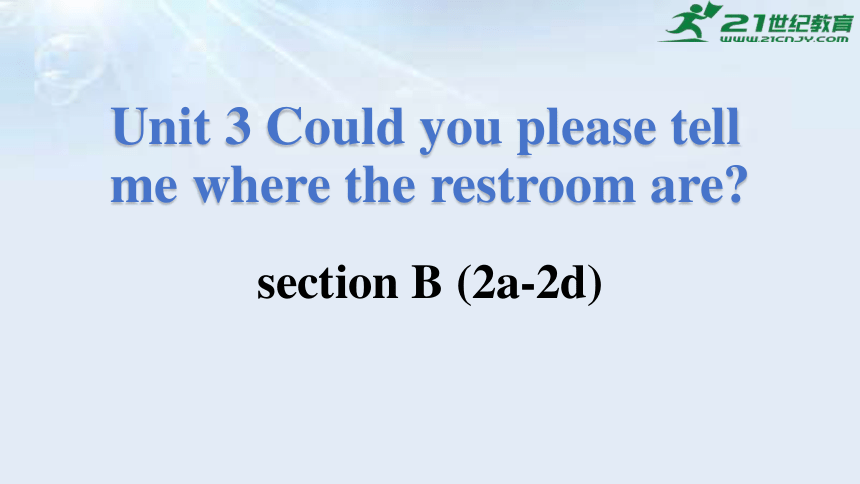
|
|
| 格式 | pptx | ||
| 文件大小 | 2.3MB | ||
| 资源类型 | 试卷 | ||
| 版本资源 | 人教新目标(Go for it)版 | ||
| 科目 | 英语 | ||
| 更新时间 | 2024-09-27 00:00:00 | ||
图片预览

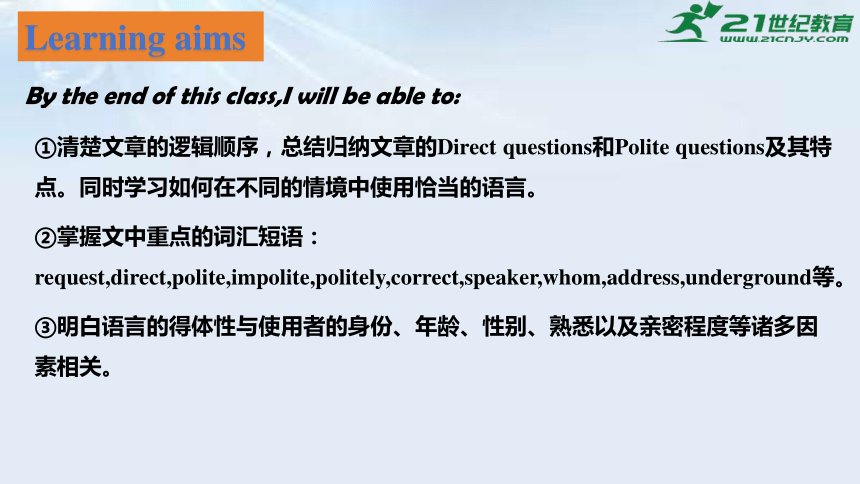
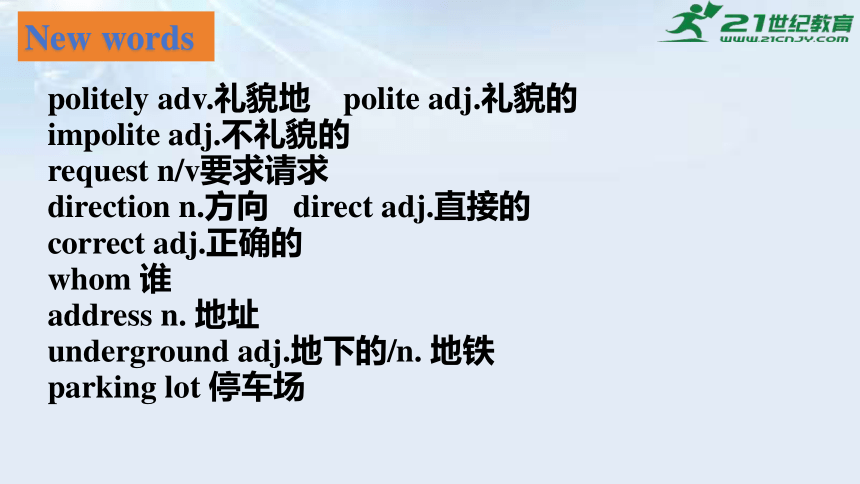
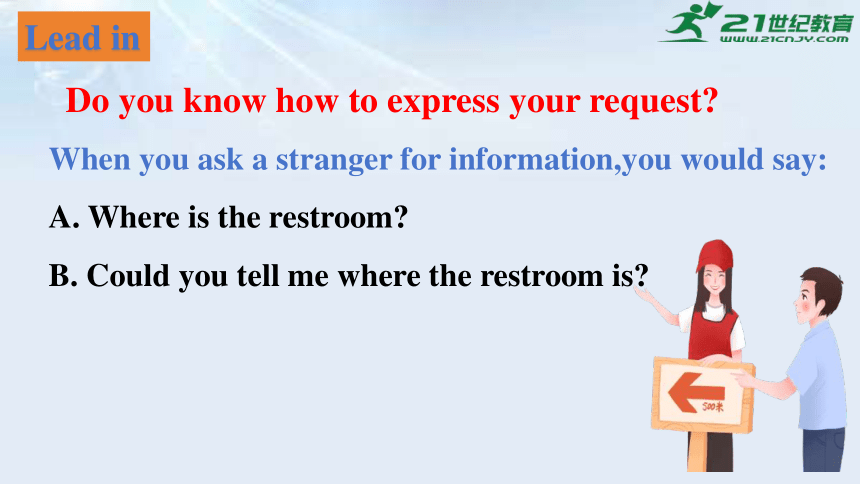
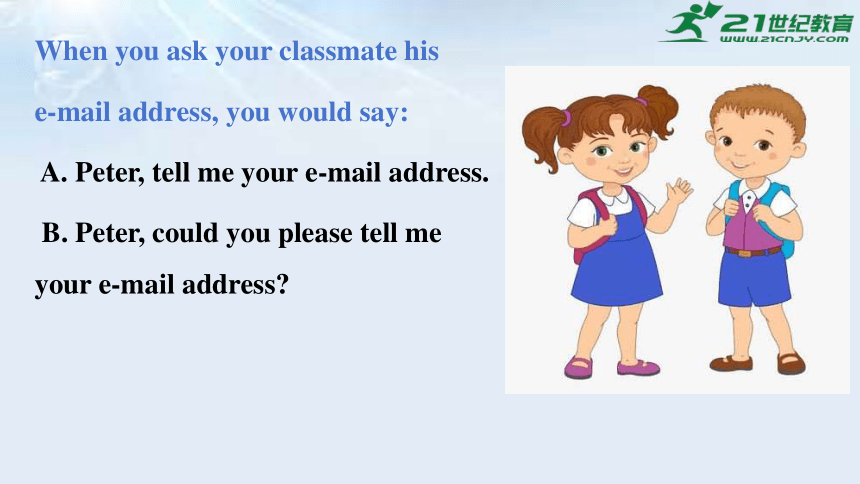

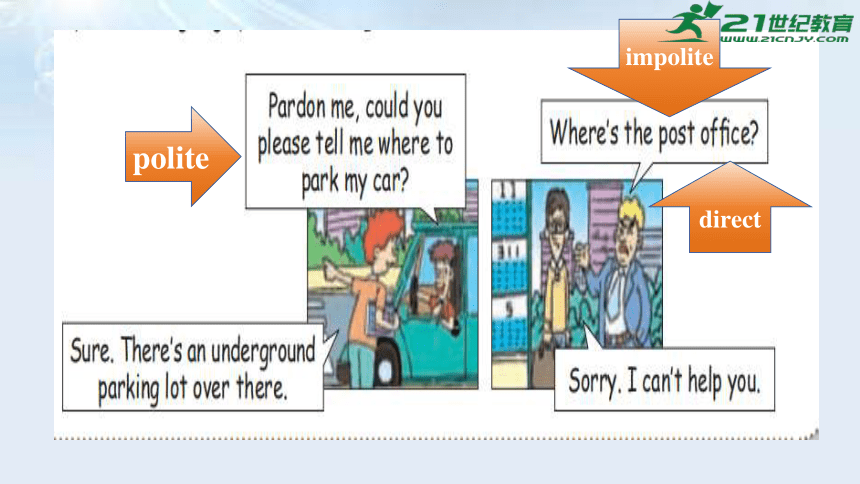
文档简介
(共19张PPT)
Unit 3 Could you please tell me where the restroom are
section B (2a-2d)
①清楚文章的逻辑顺序,总结归纳文章的Direct questions和Polite questions及其特点。同时学习如何在不同的情境中使用恰当的语言。
②掌握文中重点的词汇短语:request,direct,polite,impolite,politely,correct,speaker,whom,address,underground等。
③明白语言的得体性与使用者的身份、年龄、性别、熟悉以及亲密程度等诸多因素相关。
Learning aims
By the end of this class,I will be able to:
politely adv.礼貌地 polite adj.礼貌的
impolite adj.不礼貌的
request n/v要求请求
direction n.方向 direct adj.直接的
correct adj.正确的
whom 谁
address n. 地址
underground adj.地下的/n. 地铁
parking lot 停车场
New words
Do you know how to express your request
Lead in
When you ask a stranger for information,you would say:
A. Where is the restroom
B. Could you tell me where the restroom is
When you ask your classmate his
e-mail address, you would say:
A. Peter, tell me your e-mail address.
B. Peter, could you please tell me your e-mail address
When you ask your teacher about something, you would say:
A. When is the school trip
B. Could you please tellme when the school trip is
polite
impolite
direct
Fast reKey Phrasesading
2b Read the article and underline the topic sentence for each paragraph.
Tip:
The topic sentence is usually the first or the second sentence
of each paragraph. Sometimes it is also in the middle of the paragraph.
Careful reading
Read Parap carefully, and answer the question.
Q: When you visit a foreign country, you have to ask for help, which request is better
A. Where are the restrooms
B. Could you please tell me where the restrooms are
The two questions are similar requests
for directions and both are correct, but the first one sounds less polite than the second one.
Read para2 carefully, and answer the question.
Q:How do good speakers change the way they speak in different situations
whom they are speaking to
depend on
how well they know each other
Read para3 carefully.
Usually polite questions are longer.
Could you please...
May I ask...
Excuse me. I wonder if you can help.
I'm sorry to trouble you, but...
Longer questions can be more polite and we need to spend time leading into a request before asking for help.
Read para4 carefully, and answer the question.
Q:Is it important to speak politely or directly according to the writer
It might seem more difficult to speak politely than directly. However, it is important to learn how to use the right language in different situations.
purpose
This will help you communicate better with other people.
2c Find all the direct questions and polite requests from the passage.
Direct questions Polite questions
Where are the restrooms
Could you tell me where the restrooms are
When is the school trip
Excuse me, Mr. West. Do you
know when the school trip is
Peter, tell me your e-mail
address
Peter, could you please tell me your e-mail address
2d Read the request below. In the second column, write A if you would say it to someone you know and B if you would say it to a stranger. In the last column, write where you think these people are.
Request Person Place
1. Will you pass the salt
2. Do you know where I can change some money, please
3. Could you tell me what just happened
A
B
B
in the kitchen
on the street
on the street
4. Can you please tell me where the nearest station is
5. Excuse me, do you know what time it begins, please
6. Let me know when you’re ready, OK
7. Could you possibly tell me the way to the village school
B
B
B
A
on the street
on the street
at movie theater
at home
礼貌地寻求帮助 ______________________
改变方式 ______________________
在不同情境下 ______________________
直接的问题 ______________________
某人花费多少时间做某事 ______________________
与某人更好地交流 ______________________
地下停车场 ______________________
Key Phrases
ask for help politely
change the way
in different situations
direct questions
sb. spend some time (in) doing
communicate better with sb.
underground parking lot
1.politely adv. 礼貌;polite adj .有礼貌的;客气的
impolite adj .没有礼貌的;粗鲁的
polite 的比较级是more/less polite 更有礼貌的/不如……有礼貌。
2.request n.& v. 要求;请求
request作名词,常用词组a request for sth. 意为“某事的要求/请求”
request 作动词,常用搭配:request sb. to do sth. 要求/ 请求某人做某事
request + that 从句 从句谓语用(should+动词原形)
3.direct adj. 直接的;直率的 v. 指引;指导
反义词:indirect adj. 间接的
派生词:directly adv. 直接地 direction n. 指导;方向 director n. 导演
Language Points
1. It is ________(礼貌的) to offer seats to the old on the bus.
2. There is an ____________(地下的) supermarket in our neighborhood.
3. I didn’t write to you, because I couldn’t remember your ________.
4. I’m a stranger here and I don’t know the ________ to the old temple.
5. I wonder if I was reading the poem _________. (correct)
6. ________(who) did you give the book to
Exercises
一、根据首字母或汉语提示完成单词或用所给单词的适当形式填空。
polite
underground
address
direction
correctly
Whom
THANK YOU!
Unit 3 Could you please tell me where the restroom are
section B (2a-2d)
①清楚文章的逻辑顺序,总结归纳文章的Direct questions和Polite questions及其特点。同时学习如何在不同的情境中使用恰当的语言。
②掌握文中重点的词汇短语:request,direct,polite,impolite,politely,correct,speaker,whom,address,underground等。
③明白语言的得体性与使用者的身份、年龄、性别、熟悉以及亲密程度等诸多因素相关。
Learning aims
By the end of this class,I will be able to:
politely adv.礼貌地 polite adj.礼貌的
impolite adj.不礼貌的
request n/v要求请求
direction n.方向 direct adj.直接的
correct adj.正确的
whom 谁
address n. 地址
underground adj.地下的/n. 地铁
parking lot 停车场
New words
Do you know how to express your request
Lead in
When you ask a stranger for information,you would say:
A. Where is the restroom
B. Could you tell me where the restroom is
When you ask your classmate his
e-mail address, you would say:
A. Peter, tell me your e-mail address.
B. Peter, could you please tell me your e-mail address
When you ask your teacher about something, you would say:
A. When is the school trip
B. Could you please tellme when the school trip is
polite
impolite
direct
Fast reKey Phrasesading
2b Read the article and underline the topic sentence for each paragraph.
Tip:
The topic sentence is usually the first or the second sentence
of each paragraph. Sometimes it is also in the middle of the paragraph.
Careful reading
Read Parap carefully, and answer the question.
Q: When you visit a foreign country, you have to ask for help, which request is better
A. Where are the restrooms
B. Could you please tell me where the restrooms are
The two questions are similar requests
for directions and both are correct, but the first one sounds less polite than the second one.
Read para2 carefully, and answer the question.
Q:How do good speakers change the way they speak in different situations
whom they are speaking to
depend on
how well they know each other
Read para3 carefully.
Usually polite questions are longer.
Could you please...
May I ask...
Excuse me. I wonder if you can help.
I'm sorry to trouble you, but...
Longer questions can be more polite and we need to spend time leading into a request before asking for help.
Read para4 carefully, and answer the question.
Q:Is it important to speak politely or directly according to the writer
It might seem more difficult to speak politely than directly. However, it is important to learn how to use the right language in different situations.
purpose
This will help you communicate better with other people.
2c Find all the direct questions and polite requests from the passage.
Direct questions Polite questions
Where are the restrooms
Could you tell me where the restrooms are
When is the school trip
Excuse me, Mr. West. Do you
know when the school trip is
Peter, tell me your e-mail
address
Peter, could you please tell me your e-mail address
2d Read the request below. In the second column, write A if you would say it to someone you know and B if you would say it to a stranger. In the last column, write where you think these people are.
Request Person Place
1. Will you pass the salt
2. Do you know where I can change some money, please
3. Could you tell me what just happened
A
B
B
in the kitchen
on the street
on the street
4. Can you please tell me where the nearest station is
5. Excuse me, do you know what time it begins, please
6. Let me know when you’re ready, OK
7. Could you possibly tell me the way to the village school
B
B
B
A
on the street
on the street
at movie theater
at home
礼貌地寻求帮助 ______________________
改变方式 ______________________
在不同情境下 ______________________
直接的问题 ______________________
某人花费多少时间做某事 ______________________
与某人更好地交流 ______________________
地下停车场 ______________________
Key Phrases
ask for help politely
change the way
in different situations
direct questions
sb. spend some time (in) doing
communicate better with sb.
underground parking lot
1.politely adv. 礼貌;polite adj .有礼貌的;客气的
impolite adj .没有礼貌的;粗鲁的
polite 的比较级是more/less polite 更有礼貌的/不如……有礼貌。
2.request n.& v. 要求;请求
request作名词,常用词组a request for sth. 意为“某事的要求/请求”
request 作动词,常用搭配:request sb. to do sth. 要求/ 请求某人做某事
request + that 从句 从句谓语用(should+动词原形)
3.direct adj. 直接的;直率的 v. 指引;指导
反义词:indirect adj. 间接的
派生词:directly adv. 直接地 direction n. 指导;方向 director n. 导演
Language Points
1. It is ________(礼貌的) to offer seats to the old on the bus.
2. There is an ____________(地下的) supermarket in our neighborhood.
3. I didn’t write to you, because I couldn’t remember your ________.
4. I’m a stranger here and I don’t know the ________ to the old temple.
5. I wonder if I was reading the poem _________. (correct)
6. ________(who) did you give the book to
Exercises
一、根据首字母或汉语提示完成单词或用所给单词的适当形式填空。
polite
underground
address
direction
correctly
Whom
THANK YOU!
同课章节目录
- Unit 1 How can we become good learners.
- Section A
- Section B
- Unit 2 I think that mooncakes are delicious!
- Section A
- Section B
- Unit 3 Could you please tell me where the restroom
- Section A
- Section B
- Unit 4 I used to be afraid of the dark.
- Section A
- Section B
- Unit 5 What are the shirts made of?
- Section A
- Section B
- Review of Units 1-5
- Unit 6 When was it invented?
- Section A
- Section B
- Unit 7 Teenagers should be allowed to choose their
- Section A
- Section B
- Unit 8 It must belong to Carla.
- Section A
- Section B
- Unit 9 I like music that I can dance to.
- Section A
- Section B
- Unit 10 You're supposed to shake hands.
- Section A
- Section B
- Review of Units 6-10
- Unit 11 Sad movies make me cry.
- Section A
- Section B
- Unit 12 Life is full of the unexpected
- Section A
- Section B
- Unit 13 We're trying to save the earth!
- Section A
- Section B
- Unit 14 I remember meeting all of you in Grade 7.
- Section A
- Section B
- Review of Units 11-14
